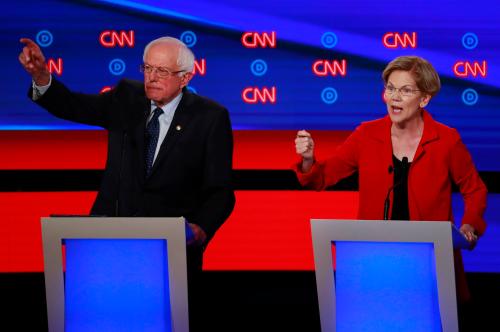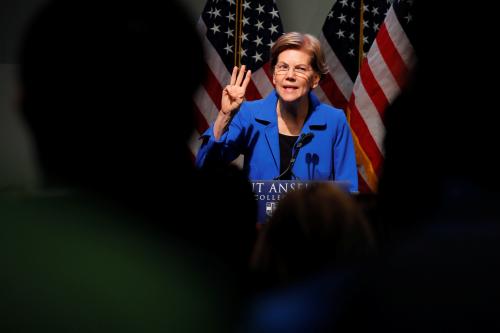The Democratic Party is clearly split along progressive-centrist lines on domestic politics, but the story is more complicated on foreign policy. In this regard, democratic candidates are separated by their attitudes more than their policies, writes Thomas Wright. This piece was originally in The Atlantic.
The Democratic Party is clearly split along progressive-centrist lines on domestic politics, but the story is more complicated on foreign policy. Throughout the course of the primary campaign, Bernie Sanders and Elizabeth Warren have pitched a distinctive progressive foreign policy that cuts the defense budget, ends military interventions, reforms the global economy, and confronts authoritarianism and networks of corruption around the world. Advisers to both campaigns are trying to clarify the progressive worldview and hope to transform Democratic foreign policy, much like neoconservatives in the 1980s and ’90s did for the Republican Party, albeit in the opposite direction.
For those of us trying to figure out where the United States goes after Donald Trump leaves office, the unfolding Democratic primary poses several questions. Is the country on the cusp of a new foreign-policy revolution? Will a progressive president break with the post–Cold War consensus? And if the next president is a Democratic centrist, like Joe Biden, Pete Buttigieg, or Amy Klobuchar, will there be an intra-party struggle about the direction of American strategy?
One answer is becoming clear: Sanders, in particular, may dramatically change U.S. foreign policy, but his shift will have very little to do with the substantive ideas in his formal writings and remarks and everything to do with his own instincts and beliefs.
On paper, Warren’s and Sanders’s outlook, despite what they say on the campaign trail, is remarkably consistent with those of the centrists. If you took the names off the foreign-policy articles written by any of the candidates, aside from a couple of flourishes, the differences would be difficult to detect. All of them want to see a foreign policy driven by values. They want the United States to play a leadership role in world affairs, they are committed to U.S. alliances, and they have placed the fight against corruption at the center of their campaigns. The progressives are as tough rhetorically on Russia and China as the centrists are, if not more so. And yes, progressives want to end the forever wars and pull back from the Middle East, but centrists would go along with much of that rhetoric too.
Most of the differences in progressive and centrist foreign policy appear to be attitudinal rather than substantive. Progressives explicitly call for new ideas and new thinking but, besides the implications for the Middle East, what this directive means is still unknown. A few progressive think-tank experts, generally affiliated with the new Quincy Institute for Responsible Statecraft, advocate for a massive reduction in U.S. military capabilities and a global retrenchment, but neither Sanders nor Warren has said anything of the sort and both are committed, at least in principle, to NATO and to maintaining America’s alliances in Asia.
Progressives are likely to identify climate change as the nation’s top national-security priority. Centrists are more likely to say the issue is one of the top three. Does the ranking really matter? Both camps intend to work on the environment, and neither wants to make geopolitical concessions to China in exchange for its cooperation.
Progressives appear to be more skeptical of trade and global markets, but as Obama-administration officials Jennifer Harris and Jake Sullivan point out in a recent piece, centrists are also thinking hard about pivoting from a neoliberal foreign economic policy to an approach that sees a much greater role for the state in investment and industrial policy.
However, the progressive and centrist schools of thought would produce quite different policies in a few areas.
Progressives want to cut the defense budget by approximately 12 percent immediately. About a quarter of these savings can come from ending military interventions in Afghanistan, Iraq, and Syria. They hope to find the rest by taking on what they see as a corrupt military industrial complex. Progressives acknowledge that these cuts may result in less capability abroad, but they argue that the United States should seek military sufficiency rather than military primacy. Achieving substantial defense-budget savings is likely to be an early priority of a progressive administration, not least because the funds are required for an ambitious domestic program. If the wealth tax and other revenue-raising measures fail in Congress or are struck down by a conservative Supreme Court, those outcomes will increase pressure on the defense budget.
Centrists also hope to make cuts to the defense budget, but from a different perspective, by first asking whether the right kind of military is in place. They believe that modernization and reform may result in savings if done correctly. Faced with a trade-off between cost and effectiveness, centrists will choose effectiveness every time. They find the concept of military sufficiency fuzzy and inadequate, especially when considering competition from China in new technologies. The United States, they say, must always seek and maintain a significant edge over its rivals. Don’t be surprised if centrists maintain defense spending at Obama-era levels or even a little bit higher.
Centrists are much more likely to keep a modest troop presence in parts of Iraq and Syria to fight ISIS. They are also more accepting of the need for drone strikes against terrorist networks. And they are willing to use the threat of force in negotiations with Iran or North Korea, just as President Barack Obama did.
Progressives argue that the United States must end the shadow war against terrorist networks and treat fighting these groups more as a matter of law enforcement with deep and structured cooperation with allies. If rare strikes are required, the president should consult with Congress and treat the decision as the exception rather than the rule. Sanders would take the threat of force off the negotiation table; Warren would keep it as a last resort.
The final substantive area of difference is geopolitics. Progressives have generally avoided discussing security competition with Russia and China, preferring to focus on economic and political domains, including fighting disinformation, corruption, and the erosion of liberal norms. Centrists agree with all that but would place a greater emphasis on maintaining a favorable balance of power in Asia and Europe, including deepening security cooperation with allies such as France, the United Kingdom, Japan, and Australia. Centrists also have a higher tolerance for risk in deterring Chinese expansionism at sea, whereas progressives are more likely to be risk averse.
All of these foreign-policy differences are important to note, but they do not add up to a fundamental clash of worldviews. One could easily imagine a centrist president accommodating progressive voices by adopting some of their priorities, particularly on fighting corruption. Similarly, a progressive president could take a pragmatic approach to the use of force against terrorists and may even champion a new use-of-force authorization through Congress.
So, then, will candidates pursue similar policies? Not so fast.
The reason the foreign-policy platforms are so alike is because the candidates’ advisers have deliberately sought to make them so. How much the candidates truly believe what they have written and said in set-piece speeches is unknown. Interviews like the one The New York Times recently conducted are helpful, but the campaigns carefully craft responses to avoid political controversy.
One crucial element to keep in mind: The impulses, temperament, background, and outlook of the person who holds the presidency matter. Each individual is different. Obama’s foreign policy diverged from what Hillary Clinton’s would have been. To some extent, any American president will operate within certain parameters, but the variance within those boundaries is incredibly important. To assume otherwise—that the institutional system or structural forces will be constraining, as some did with Trump—is an analytical error. So the candidates’ individual beliefs can be revealing.
If Sanders is elected, he is unlikely to proactively seek to upend America’s global role, but his instincts, and those of his closest advisers, will shape how he responds to the various problems he faces as commander in chief. In recent weeks, Sanders and members of his campaign have made a number of comments that suggest his foreign policy may deviate from that of the other candidates, and from his earlier positions. For example, he would likely not issue military threats unless a country directly threatened the United States. He would surely change U.S. policy toward Central and South America. He would probably have a hard time with U.S. allies that have right-leaning governments, including with the U.K. over Brexit, Australia over climate change and counterterrorism, and Japan over regional-security competition with China.
Sanders has called China a dictatorship, but he is also very publicly torn about how to reconcile this assertion with the need to work with Beijing on climate change. In the New Hampshire debate, he mused, “Instead of spending $1.8 trillion a year collectively on weapons of destruction designed to kill each other, maybe we pool our resources and fight our common enemy, which is climate change.” Imagining that he would publicly raise concerns about Chinese behavior domestically and internationally but prioritize cooperation over competition in his actions is quite easy.
Many foreign-policy experts had understood Sanders’s position to be that the United States should withdraw from the Middle East but maintain its presence in Europe and Asia. My Atlantic colleague Uri Friedman recently asked Matt Duss, Sanders’s foreign-policy adviser, about U.S. troops in Germany, Japan, and South Korea. Duss’s answer revealed a change in that thinking: “There are real questions about the cost of maintaining these huge military presences in some of these places, so we’re definitely interested in thinking hard about whether we can reduce the number of troops in these places and still meet these [security] commitments we’ve made to these partners. Economically, it’s not really sustainable in the long term.”
Duss’s remark suggests Sanders may move closer toward the retrenchment argument advanced by Quincy Institute scholars and may rely on nonmilitary tools to compete with China and Russia. The stance will raise eyebrows in Washington and allied capitals. The United States hardly has a huge military presence in these three countries—less than 150,000 troops in total—and many of the costs are covered by the host countries. The arrangement has been economically sustainable for decades.
The worldviews of other candidates are also beginning to come into focus. Michael Bloomberg has been largely silent on foreign policy during the course of the campaign, but his comments as a businessman and mayor throughout the past 20 years suggest that he would be much more predisposed to cooperation with authoritarian regimes like China and less interested in pulling back from the Middle East. Buttigieg has consistently taken a tougher line on China on the campaign trail than the other candidates, suggesting that China’s internal repression will materially affect the relationship with the United States.
The serious part of the campaign is beginning. As the candidates take center stage, the carefully constructed formal debate about how progressive foreign policy departs from centrism is receding in importance. Now is the time to listen for how the candidates’ individual beliefs and background might shape the details of those policies. The differences then may suddenly seem wider than before.







Commentary
The real progressive-centrist divide on foreign policy
February 19, 2020